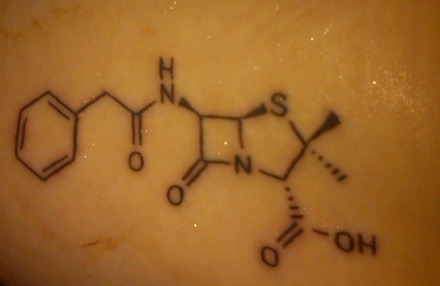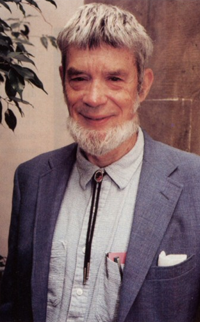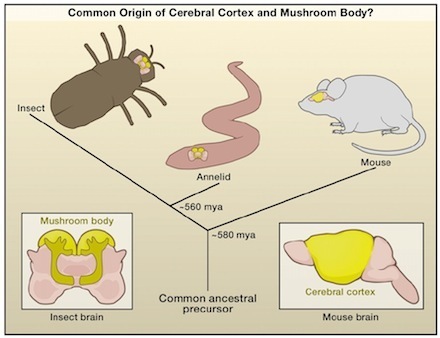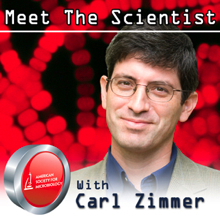Carl Zimmer's Blog, page 82
September 18, 2010
In Praise of Mistakes [Science tattoo]
 Andrew, a medical student, writes,
Andrew, a medical student, writes,
"I recently got a tattoo of Penicillin G on my arm. As someone who stumbled into medical school as a non-traditional student after a few career missteps, I appreciate a good mistake. There are few mistakes that were as amazing and important to medicine as the 'discovery' of Penicillin. Had Alexander Fleming remembered to close his laboratory's window, who knows where we would be in the fight against infectious disease?"
In case you missed my announcement
September 15, 2010
Science blog networks now officially kudzu-esque
 This is one of those meta stories that just won't quit. Over the summer, scienceblogs.com lost a bunch of bloggers thanks to a certain bubbly beverage. A lot of the bloggers moved off to set up their own blogs elsewhere, which I tried to track in this post.
This is one of those meta stories that just won't quit. Over the summer, scienceblogs.com lost a bunch of bloggers thanks to a certain bubbly beverage. A lot of the bloggers moved off to set up their own blogs elsewhere, which I tried to track in this post.
But then the bloggers began to coalesce. Order formed spontaneously from the chaos.
We saw some of them launch Scientopia
A couple settled down over at BigThink
The Guardian pinched a few for the new Guardian Science Blogs
Then the Public...
September 13, 2010
Richard Preston speaking next Monday at Yale
One of the pleasures of teaching a writing class at Yale is that I can rope in some excellent writers to give talks there. Next Monday, Richard Preston, author of The Hot Zone, The Wild Trees, and many other books and New Yorker articles, will be coming to New Haven to give a public lecture. Please join us!
When: September 20, 2010, 5:30 p.m.
Where:
Burke Auditorium, Kroon Hall
Yale School of Forestry & Environmental Studies
195 Prospect St.
New Haven, CT

Science Ink: I want your skin! [Science Tattoo]
 Melinda writes,
Melinda writes,
I have attached a photo of my Dirac Equation tattoo, which I obtained a few months ago. I am really happy with it. In fact, it caused quite a stir at the Yuri's Night celebration at NASA Ames. I'm a physics student and research at the University of California, Santa Cruz. I currently conduct research analyzing gamma ray radiation from astronomical sources (blazars and pulsars mainly) with Cerenkov detectors located in Amado, Arizona…Side Note: The equation was written up...
September 11, 2010
Do you feel the need to read?
September 10, 2010
George Williams has died: Reflections and an interview
 The evolutionary biologist George Williams died on Wednesday at the age of 84. He was one of the most important evolutionary biologists of the twentieth century, although he's not a familiar name beyond scientific circles. Gently, persistently, he reformulated how we think about natural selection and its many effects. As Richard Dawkins noted today, "He was one of the great evolutionary thinkers of my lifetime."
The evolutionary biologist George Williams died on Wednesday at the age of 84. He was one of the most important evolutionary biologists of the twentieth century, although he's not a familiar name beyond scientific circles. Gently, persistently, he reformulated how we think about natural selection and its many effects. As Richard Dawkins noted today, "He was one of the great evolutionary thinkers of my lifetime."
In 2004, I wrote a profile of Williams for Science. The occasion was a meeting...
September 9, 2010
Coming up at noon: Word of Mouth radio show
Just quick note that I'm about to go onto the public radio show Word of Mouth a few minutes past noon EST. We'll be talking about my recent piece in the New York Times about inclusive fitness. You can listen live from their web site or catch up later with a podcast.

All about books at NASW this November
The National Association of Science Writers will be getting together in my backyard over in New Haven in November. The lineup is coming together nicely. I pitched in a little on organizing two sessions on books, which I think will be fantastic. (I'm on one of the panels, but it would still be fantastic if I were bound and gagged in the corner.)
Here are the book sessions:
Great science writing part I: How I found that story
SPEAKERS:
Misha Angrist
September 3, 2010
The Worm In Your Brain
 One of the most fascinating things about the history of life is the way distantly related species can look alike. In some cases, the similarities are superficial, and in other cases they are signs of a common ancestry. And sometimes–as in the case of our brain and the brains of worms–it's a little of both.
One of the most fascinating things about the history of life is the way distantly related species can look alike. In some cases, the similarities are superficial, and in other cases they are signs of a common ancestry. And sometimes–as in the case of our brain and the brains of worms–it's a little of both.
The biggest feature of our brains is a massive stack of densely woven neurons called the cerebral cortex. Once our brains take in sensory information, it's the cortex that integrates it...
September 2, 2010
My new podcast: The ocean's superorganism
 On my latest podcast, I talk to Forest Rohwer, a San Diego State University scientist, about those rain forests of the sea, coral reefs. Rohwer studies the criss-crossing partnerships that keep corals alive–the animals that build the reefs, the algae that harness sunlight for them, the bacteria that make compounds and recycle waste, the fish that scrape off parasitic algae, and on and on. When you consider the hundreds of microbe species that live in each reef, corals and our own bodies
On my latest podcast, I talk to Forest Rohwer, a San Diego State University scientist, about those rain forests of the sea, coral reefs. Rohwer studies the criss-crossing partnerships that keep corals alive–the animals that build the reefs, the algae that harness sunlight for them, the bacteria that make compounds and recycle waste, the fish that scrape off parasitic algae, and on and on. When you consider the hundreds of microbe species that live in each reef, corals and our own bodies










